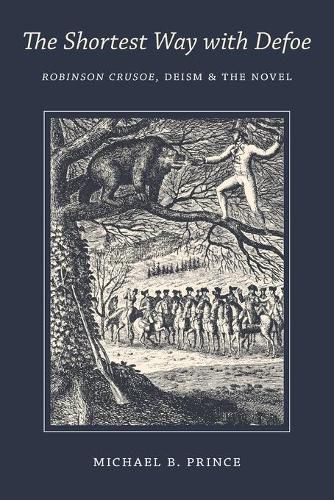Readings Newsletter
Become a Readings Member to make your shopping experience even easier.
Sign in or sign up for free!
You’re not far away from qualifying for FREE standard shipping within Australia
You’ve qualified for FREE standard shipping within Australia
The cart is loading…






This title is printed to order. This book may have been self-published. If so, we cannot guarantee the quality of the content. In the main most books will have gone through the editing process however some may not. We therefore suggest that you be aware of this before ordering this book. If in doubt check either the author or publisher’s details as we are unable to accept any returns unless they are faulty. Please contact us if you have any questions.
A scholarly and imaginative reconstruction of the voyage Daniel Defoe took from the pillory to literary immortality, The Shortest Way to Defoe contends that Robinson Crusoe contains a secret satire, written against one person, that has gone undetected for 300 years. By locating Defoe’s nemesis and discovering what he represented and how Defoe fought him, Michael Prince’s book opens the way to a new account of Defoe’s emergence as a novelist.
The book begins with Defoe’s conviction for seditious libel for penning a pamphlet called The Shortest Way with the Dissenters (1702). A question of biography segues into questions of theology and intellectual history and of formal analysis; these questions in turn require close attention to the early reception of Defoe’s works, especially by those who hated or suspected him. Prince aims to recover the way of reading Defoe that his enemies considered accurate. Thus, the book rethinks the positions represented in Defoe’s ambiguous alternation and mimicking of narrative and editorial voices in his tracts, proto-novels, and novels.
By examining Defoe’s early publications alongside Robinson Crusoe, Prince shows that Defoe traveled through non-realist, non-historical genres on the way to discovering the form of prose fiction we now call the novel. Moreover, a climate (or figure) of extreme religious intolerance and political persecution required Defoe to always seek refuge in literary disguise. And, religious convictions aside, Defoe’s practice as a writer found him inhabiting forms known for their covert deism.
$9.00 standard shipping within Australia
FREE standard shipping within Australia for orders over $100.00
Express & International shipping calculated at checkout
This title is printed to order. This book may have been self-published. If so, we cannot guarantee the quality of the content. In the main most books will have gone through the editing process however some may not. We therefore suggest that you be aware of this before ordering this book. If in doubt check either the author or publisher’s details as we are unable to accept any returns unless they are faulty. Please contact us if you have any questions.
A scholarly and imaginative reconstruction of the voyage Daniel Defoe took from the pillory to literary immortality, The Shortest Way to Defoe contends that Robinson Crusoe contains a secret satire, written against one person, that has gone undetected for 300 years. By locating Defoe’s nemesis and discovering what he represented and how Defoe fought him, Michael Prince’s book opens the way to a new account of Defoe’s emergence as a novelist.
The book begins with Defoe’s conviction for seditious libel for penning a pamphlet called The Shortest Way with the Dissenters (1702). A question of biography segues into questions of theology and intellectual history and of formal analysis; these questions in turn require close attention to the early reception of Defoe’s works, especially by those who hated or suspected him. Prince aims to recover the way of reading Defoe that his enemies considered accurate. Thus, the book rethinks the positions represented in Defoe’s ambiguous alternation and mimicking of narrative and editorial voices in his tracts, proto-novels, and novels.
By examining Defoe’s early publications alongside Robinson Crusoe, Prince shows that Defoe traveled through non-realist, non-historical genres on the way to discovering the form of prose fiction we now call the novel. Moreover, a climate (or figure) of extreme religious intolerance and political persecution required Defoe to always seek refuge in literary disguise. And, religious convictions aside, Defoe’s practice as a writer found him inhabiting forms known for their covert deism.